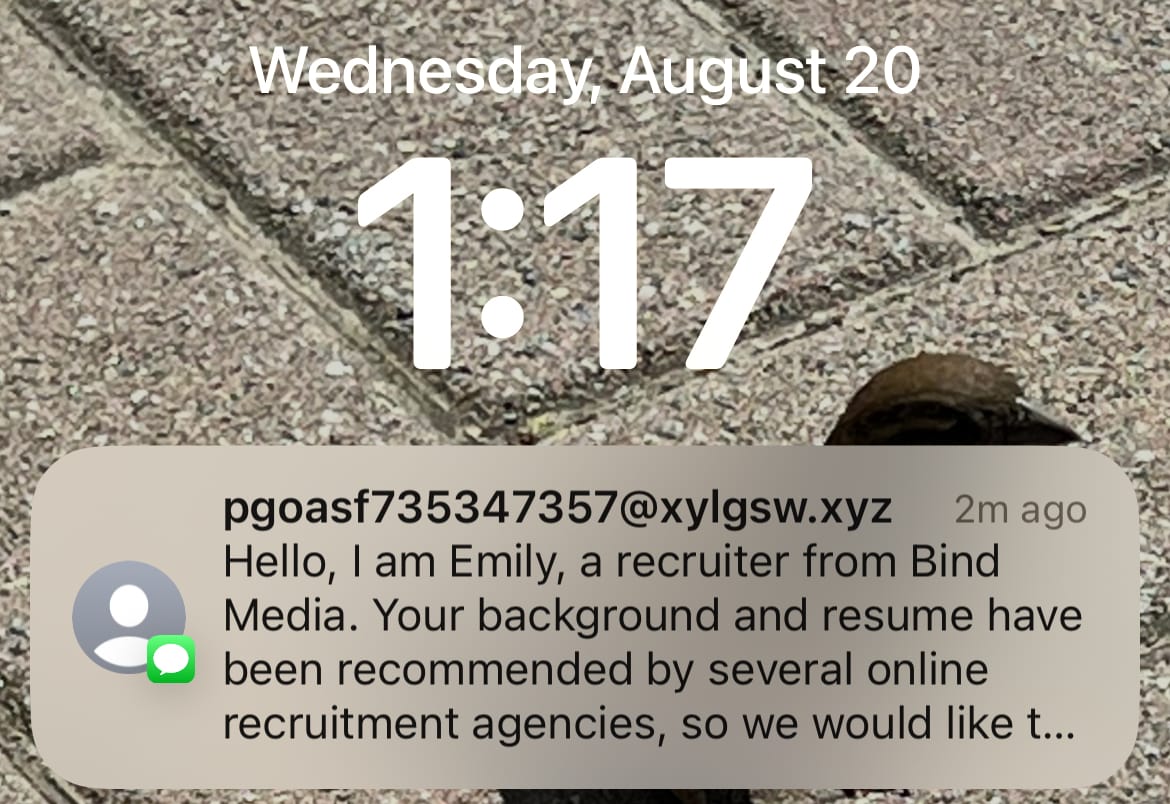Cyberscams: Don't get hooked by tempting texts recruiting for jobs with pay that's too good to be true
Scammers aren't after money in messages that can look legitimate, they are after your personal info for identity theft
Every other day or so I get yet another job offer that will pay upwards of $400 a day for something like 90 minutes of work.
Ya, right.
Among the many dangerous scams out there that can tempt people are these too-good-to-be-true job recruitment offers that are nothing more than personal information phishing scams via LinkedIn and WhatsApp.
Literally as I was typing the above sentence, my phone dinged with the second one I received today, a text from "Emily." Here's a screenshot:

This one was from a fake "Emily" supposedly recruiting for Blind Media and follows the formula: telling me that my background and résumé were recommended by several online recruitment agencies, so they want to offer me an "excellent" remote part-time job requiring 60 to 90 minutes of work each day paying $250 to $450 daily with a base salary of $2,250. How to apply? Add the number on WhatsApp.
The one I received early this morning was similar.
“Hello, I’m Yana, a Recruiter at Adecco. We have a remote, part-time job. Work 60–90 minutes a day, earn daily pay of $250–$450, flexible hours, no experience required. WhatsApp us at [link].”
If you have a LinkedIn profile you might have received texts like this, particularly if you have your profile set to #opentowork you might get these messages that at least tangentially address your skill set so can be tempting. Adecco is a legitimate Swiss-French human resources company.
“One of the most prominent trends we are seeing is a rise of recruitment lure scams,” according to Darren Pauli, a cybersecurity specialist at Australian telecom company Telstra in an article posted just yesterday (Aug. 19, 2025) in an article in online newspaper News.com.au.
“They prey on people looking for extra income with fake job opportunities that seem legitimate. Instead of asking for money, scammers ask for personal information like identification documents that they can use for identity theft or to sell on the dark web.”
Pauli's messaging on this is recent and to an Australian audience, but the scam isn't particularly new. It can suddenly start hitting people who are actually looking for work.
“We’re receiving dozens of reports a day, specifically about WhatsApp-based scams copying the names of legitimate recruitment firms,” according to Keith Rosser, group director at UK employment agency Reed and chair of the UK fraud-watch group JobsAware in a 2023 article on EuroNews.
Some red flags that should be obvious but desperate job seekers might overlook
- Unrealistic Pay, Minimal Work
A “job” promising hundreds per day for an hour of easy work is a classic red-flag. Job scams promising high pay for little effort are spiking – victims often lose significant sums to bogus tasks, fake dashboards, or crypto wallets. - WhatsApp Is Not a Hiring Tool
Legitimate recruiters don’t move conversations to WhatsApp or ask applicants to apply via messaging apps. As Adecco advises, real recruitment comes through official platforms – never WhatsApp links or unspecified messaging apps. - Impersonation of a Trustworthy Brand
Adecco explicitly warns that scammers use its name illegitimately and never ask candidates for money during the recruitment process. - Check the Format of Email Message Comes From
Needless to say, if you spot it you'll know it's fake, but pgoasf735347357@xylgsw.xyz isn't the most legitimate of email addresses in the one I received this afternoon from "Emily." And this morning from "Yana," it came from 643148, whatever that is supposed to be.
What to do, what not to do
• Pause when you see a recruitment message of any kind: Don't be so vain and think this text is about you. Don’t respond or click any link.
• Check directly: I scrolled through Adecco’s official website, no such job exists.
• Delete and block: Remove the message, block the number.
Warning Sign ––> What to Do Instead
High pay for easy work ––> If it sounds too good to be true, it probably is
Communication via WhatsApp or social media apps ––> Legitimate recruiters use official emails and platforms
Requests for fees, personal data, crypto wallets ––> Don’t share—you’re likely facing an advance-fee or identity scam
Advertising en masse with no proper channels ––> Verify through company’s official job pages or LinkedIn.
-30-
Want to support independent journalism?
Consider becoming a paid subscriber or make a one-time donation so I can continue this work.
Paul J. Henderson
pauljhenderson@gmail.com
facebook.com/PaulJHendersonJournalist
instagram.com/wordsarehard_pjh
x.com/PeeJayAitch
wordsarehard-pjh.bsky.social
